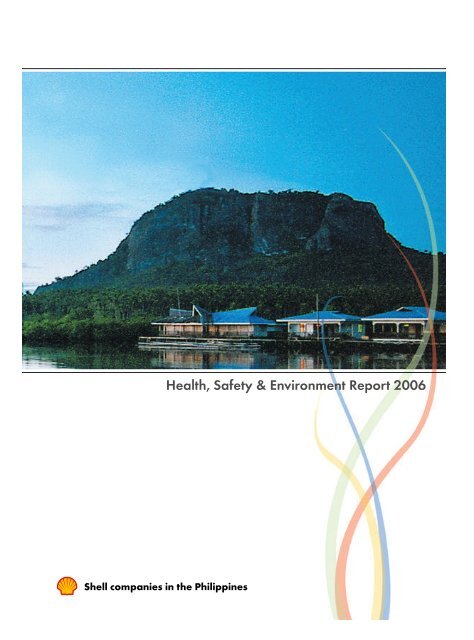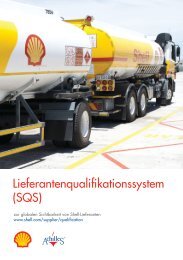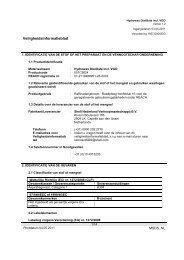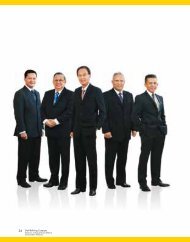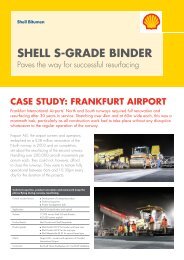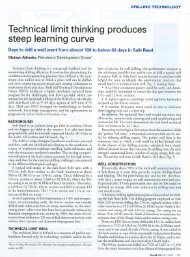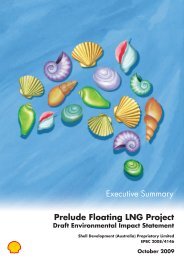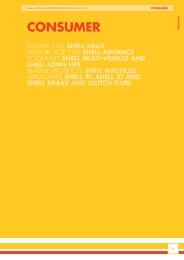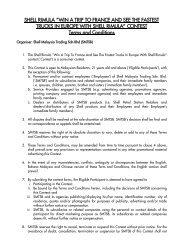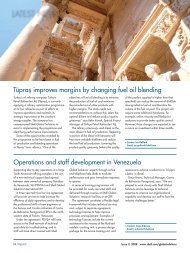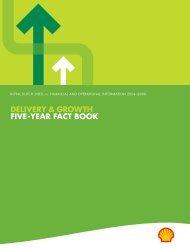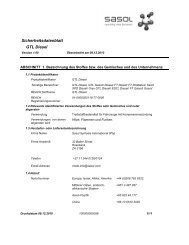Health One - Shell
Health One - Shell
Health One - Shell
You also want an ePaper? Increase the reach of your titles
YUMPU automatically turns print PDFs into web optimized ePapers that Google loves.
CONTENTS ABOUT THIS REPORT<br />
01<br />
02<br />
03<br />
04<br />
07<br />
08<br />
12<br />
18<br />
24<br />
36<br />
<strong>Shell</strong> companies in the Philippines<br />
Message from the Country Chairman<br />
Overview<br />
Policy and Commitment<br />
HSE Performance Highlights<br />
<strong>Health</strong><br />
Safety<br />
Environment<br />
Sustainable Development<br />
<strong>Shell</strong> General Business Principles<br />
PRINTED ON RECYCLED PAPER FOR THE CONSIDERATION OF THE ENVIRONMENT<br />
There are 7,107 awe-inspiring islands in the Philippines.<br />
Each island is as unique as the captivating scenic<br />
wonders found, as remarkable as the diversity of culture<br />
embodied in its people.<br />
To adhere to <strong>Shell</strong>’s policy of no harm to its people<br />
and the environment, <strong>Shell</strong> conducts its business<br />
with <strong>Health</strong>, Safety and Environment (HSE)<br />
as its primary concern, in the Philippines<br />
and the rest of the world.<br />
This report reflects the many initiatives and performance<br />
in HSE of the <strong>Shell</strong> companies in the Philippines<br />
for the year 2006.<br />
The Cover<br />
Tawi-Tawi is one of the two provinces of<br />
Sulu. Located at the southernmost tip of<br />
Mindanao, it boasts of white, sandy<br />
beaches and rocky coasts spread over<br />
107 islands and islets. <strong>Shell</strong> reaches out<br />
to this distant province with various<br />
sustainable development programmes.
SHELL COMPANIES IN THE PHILIPPINES<br />
The <strong>Shell</strong> companies in the Philippines (SciP) is a member of The <strong>Shell</strong> Group,<br />
also referred to as Group, which operates in over 135 countries in the world.<br />
<strong>Shell</strong>'s partnership with the Filipinos started in 1914 when <strong>Shell</strong> established its corporate presence<br />
and organised its first trading office. Today, the <strong>Shell</strong> companies in the Philippines (SciP)<br />
is one of the largest private investors in the country, composed of different companies<br />
involved in the upstream and downstream aspects of the oil and gas industry.<br />
Pilipinas <strong>Shell</strong> Petroleum Corporation (PSPC)<br />
PSPC serves customers in almost every field of transport, commerce and industry<br />
with a wide range of high quality fuels, lubricants, liquefied petroleum gas,<br />
aviation fuel, bitumen and other specialty products.<br />
<strong>Shell</strong> Shared Services Center - Manila (SSSC-Manila)<br />
Formerly known as <strong>Shell</strong> Shared Services Asia, B.V., SSSC-Manila was established in 2004<br />
and initially handled part of the transactional accounting work for <strong>Shell</strong> Oil Products US (SOPUS)<br />
and Motiva. It provides accounting, human resources and other business-related processing<br />
using IT-enabled facilities for <strong>Shell</strong> companies operating in various parts of the world.<br />
<strong>Shell</strong> Gas Eastern, Inc. (SGEI) and <strong>Shell</strong> Gas Trading Asia Pacific (SGTAP)<br />
SGEI operates the only refrigerated propane and butane entrepot terminal in the Philippines,<br />
while SGTAP is responsible for pressurised LPG trading East of Suez.<br />
<strong>Shell</strong> Philippines Exploration B.V. (SPEX)<br />
SPEX is the developer of the Malampaya Deepwater Gas-to-Power Project and operator<br />
of its upstream component on behalf of joint venture partners, ChevronTexaco Malampaya LLC<br />
and the Philippine National Oil Company Exploration Corporation.<br />
Its operation involves the extraction, processing and transport of natural gas.<br />
<strong>Shell</strong> Chemicals Philippines, Inc. (SCPI)<br />
SCPI is the country’s world-class petrochemicals supplier with an extensive link of modern oil<br />
refineries, state-of-the-art petrochemical complexes and trading networks.<br />
<strong>Shell</strong> Solar Philippines Corporation (SSPC)<br />
SSPC studies, builds and operates projects that involve solar power and renewables.<br />
It designs and provides solar lighting solutions for domestic and commercial applications.<br />
Pilipinas <strong>Shell</strong> Foundation, Inc. (PSFI)<br />
Established in 1982 with a seed fund from PSPC, Pilipinas <strong>Shell</strong> Foundation, Inc.<br />
is dedicated to the mission of enabling the disadvantaged to become productive<br />
and responsible members of society.<br />
Notwithstanding the diversity of the companies under its wings, all <strong>Shell</strong> companies in the Philippines<br />
operate under the guidance of the same set of core values – honesty, integrity, and respect for<br />
people. In all its conducts and affairs, all the <strong>Shell</strong> companies are governed by the <strong>Shell</strong> General<br />
Business Principles and ably guided by a common belief in the fundamental importance of trust,<br />
openness, teamwork, professionalism and pride in what they do.<br />
<strong>Health</strong>, Safety & Environment Report 2006<br />
01
02<br />
<strong>Health</strong>, Safety & Environment Report 2006<br />
MESSAGE FROM THE COUNTRY CHAIRMAN<br />
Edgar O. Chua<br />
Country Chairman<br />
<strong>Shell</strong> companies in the Philippines<br />
<strong>Shell</strong> is a company driven by its core values of honesty, integrity<br />
and respect for people. Our values serve as the foundation<br />
for our business principles, which offer <strong>Shell</strong>’s overall commitment<br />
to Sustainable Development (SD).<br />
Our SD thrust drives the way we conduct our operations, in<br />
a socially and environmentally responsible manner. It requires<br />
us to continue to improve our performance in <strong>Health</strong>, Safety<br />
and Environment (HSE), to ensure no harm to people and the<br />
environment.<br />
In 2006, we globally launched the HSE Golden Rules:<br />
Comply with the law, standards and procedures,<br />
Intervene in unsafe or non-compliant situations<br />
and Respect our neighbours. The Golden Rules aim to<br />
further amplify our commitment towards HSE. At <strong>Shell</strong>, HSE is placed with utmost<br />
importance -- it is our licence to operate.<br />
Our performance in this area is an excellent barometer of whether we can continue<br />
to operate in a community. We cannot operate where we do harm to the environment<br />
and the community or put our employees at risk. Like any critical business activity,<br />
we make it a part of everything we do.<br />
The practice of good HSE is implemented everywhere <strong>Shell</strong> operations are present.<br />
It is but fitting that our HSE performance and accomplishments are described with<br />
the beautiful Philippine sceneries serving as our backdrop. This is reflected in the<br />
many places where <strong>Shell</strong> operates and touches many an islander’s life.<br />
May the beauty of the Philippine islands inspire and move you for the greater<br />
good of our people and the protection of our environment.
OVERVIEW<br />
This report outlines the performance and accomplishments of the <strong>Shell</strong> companies in the<br />
Philippines for the year 2006. This covers the areas of <strong>Health</strong>, Safety, and Environment<br />
(HSE) in line with its commitment to report its HSE performance.<br />
There are five chapters in this report. The first chapter covers <strong>Shell</strong>’s Policy and Commitment<br />
as well as a summary of its businesses in the Philippines. Chapters two to four feature<br />
the highlights of the company’s HSE performance. The last chapter presents some<br />
of the broader programmes on Sustainable Development (SD).<br />
The <strong>Shell</strong> Group of companies operates under a common set of business principles,<br />
supported by policies and business controls. These include a Group HSE Commitment<br />
and Policy (the <strong>Shell</strong> Group Commitment and the HSE Policy), which require that every<br />
<strong>Shell</strong> company shall have a systematic approach to HSE management.<br />
<strong>Shell</strong> in the Philippines updated its HSE policy in October 2003 requiring its companies<br />
to manage HSE matters. Like any other critical business activity, it sets targets<br />
for improvements and measures, then appraises and reports performance.<br />
The management of security is also an integral part of <strong>Shell</strong>’s policy and the term HSSE<br />
(<strong>Health</strong>, Safety, Security and Environment) is sometimes used to reflect this.<br />
Palawan<br />
The country’s fourth-largest island<br />
group is blessed with 1,768 islands<br />
and islets of coves, beaches and<br />
virgin forests and is located<br />
southwest of the Philippines.<br />
<strong>Shell</strong> is a strong supporter of<br />
numerous sustainable development<br />
projects, together with the<br />
Malampaya Joint Venture Partners.<br />
<strong>Health</strong>, Safety & Environment Report 2006<br />
03
04<br />
<strong>Health</strong>, Safety & Environment Report 2006<br />
POLICY AND COMMITMENT<br />
<strong>Shell</strong> companies in the Philippines are committed to:<br />
• Pursue the goal of no harm to people<br />
• Protect the environment in a manner that is consistent with the principles<br />
of Sustainable Development<br />
• Use materials and energy efficiently to provide its products and services<br />
• Develop energy resources, products and services consistent<br />
with these aims<br />
• Publicly report its performance<br />
• Play a leading role in promoting best practice in its industries<br />
• Create a secure business environment that minimises economic loss<br />
and business disruption while safeguarding its people<br />
• Manage HSE matters as any other critical business activity<br />
• Promote a culture in which all <strong>Shell</strong> employees share this commitment<br />
HSE MANAGEMENT IN SciP<br />
<strong>Shell</strong> comprehensively manages health, safety and environment as a critical<br />
part of its business process. In the Philippines, <strong>Shell</strong>'s HSE-MS is fully aligned<br />
with the <strong>Shell</strong> Group's standards and employs a systematic approach to<br />
achieve continuous performance improvement. To ensure success, the<br />
following key elements are required in the process:<br />
Visible management leadership<br />
The senior executives of each business collectively and individually provide<br />
visible HSE leadership and commitment. They set a personal example,<br />
hold key staff accountable for HSE management and ensure sufficient<br />
resources are committed. This is to ensure that the HSE Policy and the Group<br />
Procedure will be appropriately implemented in their line of business.
Policy and strategic objectives<br />
Consistent with its commitment to contribute to the principles of Sustainable<br />
Development, all lines of business have adopted the following HSE policy:<br />
• Have a systematic approach to HSE management designed to ensure<br />
compliance with the law and to achieve continuous performance<br />
improvement<br />
• Set targets for improvement and to measure, appraise and report its<br />
performance<br />
• Require contractors and other business partners to manage HSE<br />
in line with this policy<br />
• Require joint ventures under its operational control to apply this policy,<br />
and use its influence to promote it in the company's other ventures<br />
• Include HSE performance in the appraisal of all employees<br />
Organisational responsibilities<br />
HSE is clearly a line responsibility and is managed by every manager<br />
responsible for each business or function. This responsibility includes HSE<br />
planning and performance appraisal as part of overall business management.<br />
This is to ensure legal compliance and implementation of <strong>Shell</strong> Group<br />
policies and standards. Each business defines and communicates clear roles<br />
and responsibilities for achieving these within its area of activity.<br />
Hazards and Effects Management Process (HEMP)<br />
Part of <strong>Shell</strong>'s management of risk is the anticipation of what can go wrong.<br />
Through HEMP, each business does an inventory of its critical activities<br />
and operational risks together with the possible effects on people's health<br />
and safety, property, environment, and business reputation.<br />
<strong>Health</strong>, Safety & Environment Report 2006<br />
05
06<br />
<strong>Health</strong>, Safety & Environment Report 2006<br />
Standards, procedures and document control<br />
Individual line of business HSE-MS's address the integration of HSE<br />
management into their business planning. Each year, programmes for HSE<br />
management are integrated into line of business plans as part of the Targets<br />
and Resources process, including the formulation of short and medium term<br />
HSE improvement targets and action plans.<br />
Implementation, monitoring and corrective action<br />
To ensure compliance, HSE auditing is conducted in accordance with the<br />
requirements of the HSE Panel. HSE Auditing of Line of Business Activities<br />
include all HSE critical operations and installations at least once every five<br />
years. Similarly, the country HSE-MS framework is independently audited<br />
every five years.<br />
Utilising a process feedback loop, the key elements in <strong>Shell</strong>'s HSE-MS allow<br />
for a conscientious approach in managing health, safety and environment<br />
risks in each line of business.<br />
<strong>Shell</strong>'s senior leaders provide direction on HSE management in their respective<br />
businesses. Every year, they set strategic objectives that support the HSE<br />
commitment and policy, which are integral to the company's performance<br />
scorecard.
HSE PERFORMANCE HIGHLIGHTS 2006<br />
<strong>Shell</strong> companies in the Philippines (SciP)’s performance in <strong>Health</strong>, Safety, Security and Environment<br />
(HSSE) remained strong in 2006 with most businesses meeting safety targets on metrics such as fatalities<br />
and lost time injuries (LTIs).<br />
In January 2006, the Global <strong>Health</strong> <strong>One</strong> organisation was launched to manage health and medical<br />
services for all <strong>Shell</strong> companies. <strong>Health</strong> <strong>One</strong> aims to improve operational excellence of corporate health<br />
services, reduce costs and to streamline the execution of medical response.<br />
The company also launched the HSE Golden Rules, which aim to amplify the HSE commitment across<br />
the <strong>Shell</strong> community and simplify the requirements, as follows:<br />
You and I will:<br />
• Comply with the law, standards and procedures<br />
• Intervene in unsafe and non-compliant situations<br />
• Respect our neighbours<br />
These Golden Rules were cascaded during the 5th <strong>Health</strong>, Safety, Security and Environment (HSSE)<br />
Week held in June 2006, across all <strong>Shell</strong> sites in the Philippines with the theme 'Leadership at Every Level'<br />
for 2006. The celebration included activities such as blood donation drives, an HIV-AIDS awareness<br />
campaign, HSE trainings, tree planting activities, and security awareness seminars.<br />
The Country HSSE Management System was updated in September to reflect changes and revisions on<br />
existing policies and guidelines related to <strong>Health</strong>, Safety, Security and Environment. The SciP Crisis<br />
Management Plan was also updated in October 2006 to align with the <strong>Shell</strong> Global Crisis Plan,<br />
among other pertinent revisions.<br />
<strong>Health</strong>, Safety & Environment Report 2006<br />
07
HEALTH<br />
08<br />
<strong>Health</strong>, Safety & Environment Report 2006<br />
Dubbed as the last frontier of the Philippines, Palawan is the fourth largest island group.<br />
Mountainous forests, breathtaking beaches, rugged cliffs and coasts are spread over 1,768 islands<br />
stretching from Busuanga up north to Balabac down south. Palawan is home to the St. Paul<br />
underground river in Sabang, the largest navigable river in the world. Just off its shoreline lies<br />
the 33,200 hectare Tubbataha Reef Marine Park, a UNESCO World Heritage Site by virtue<br />
of its outstanding biodiversity. Palawan is similarly home to <strong>Shell</strong>'s oil depot, Malampaya<br />
natural gas exploration project, and numerous sustainable development programmes.
OVERVIEW<br />
<strong>Shell</strong> carries out its business in a manner that protects its<br />
employees, business partners and neighbours from harm.<br />
It complements this with physical, mental and social programmes<br />
that promote their well-being.<br />
2006 marked a good year for <strong>Health</strong> Services as it achieved<br />
several milestones, maintained its delivery and promotion of<br />
better health programmes to staff and dependents.<br />
Among the 2006 milestones, <strong>Shell</strong> companies in the Philippines<br />
(SciP) turned in an excellent performance in surpassing<br />
the score on the Minimum <strong>Health</strong> Management Standards<br />
(MHMS).<br />
Some of the year's more notable programmes include HIV<br />
Voluntary Counselling and Testing (VCT), mass vaccination<br />
against seasonal influenza, the Blood Supply Programme, and<br />
the continuation of the Food Safety Programme.<br />
Minimum <strong>Health</strong> Management Standards<br />
Business Unit MHMS<br />
Score<br />
Exploration and Production 3.61<br />
Manufacturing 2.60<br />
Distribution 3.10<br />
Supply 3.32<br />
Retail 3.10<br />
Commercial Fuels 3.30<br />
International Marine 3.00<br />
LPG 3.50<br />
Global Lubricants 3.10<br />
Bitumen 3.40<br />
Aviation 3.20<br />
Chemicals 3.30<br />
<strong>Shell</strong> companies in the Philippines continued exceeding its past performance in terms of Minimum <strong>Health</strong><br />
Management Standards (MHMS) with almost each business unit surpassing the target of 2.8.<br />
This proved that the Seven (7) MHMS are fully imbedded in each of the <strong>Shell</strong> businesses. These are:<br />
(1) Fitness for Work<br />
(2) Local <strong>Health</strong> Facilities and Medical Emergency<br />
(3) <strong>Health</strong> Risk Assessment<br />
(4) Monitoring of <strong>Health</strong> Performance and Incident Reporting and Investigation<br />
(5) <strong>Health</strong> Impact Assessment<br />
(6) Human Factors Engineering in New Projects<br />
(7) Product Stewardship<br />
MHMS is being applied in the work system, with control and recovery measures being implemented to minimise<br />
the health risks to all staff. Regular cross checks of its applications are conducted to maintain its full functionality<br />
within operations and across all businesses. Awareness and Knowledge Workshops about the seven MHMS<br />
are continuously being conducted for HSE focals and staff who are responsible for its implementation.<br />
<strong>Shell</strong> <strong>Health</strong> Services Launch <strong>Health</strong> <strong>One</strong><br />
The year 2006 witnessed the rebirth of <strong>Shell</strong> <strong>Health</strong> Services with the successful launch of the "<strong>Health</strong> <strong>One</strong>"<br />
organisation. <strong>Health</strong> <strong>One</strong> aims to improve operational excellence of corporate health services, reduce costs<br />
and to streamline the execution of medical response. The new organisation offers a globally integrated health<br />
resource that ensures easy access to other countries' experiences, knowledge and expertise. The new<br />
organisation also promises a more aggressive role for the health team in support of the <strong>Shell</strong> business within<br />
each country or region.<br />
<strong>Health</strong>, Safety & Environment Report 2006<br />
09
10<br />
Safeguard Your Family:<br />
<strong>Health</strong> Focus during the SD-HSSE Week 2006<br />
The SD-HSSE Week in June 2006 was aimed at enhancing awareness,<br />
appreciation and implementation of staff and stakeholders on SD and HSE.<br />
The health activities focused on safeguarding the staff and their families<br />
from two (2) pandemic viruses - HIV and influenza. An information and<br />
prevention campaign was also launched and conducted SciP-wide<br />
in coordination with External Affairs and Human Resources.<br />
<strong>Shell</strong> <strong>Health</strong> Services also intensified its Blood Supply Programme by<br />
overseeing a bloodletting activity simultaneous with the Philippine National<br />
Red Cross' celebration of World Blood Donor Day.<br />
<strong>Health</strong> Programmes in 2006<br />
<strong>Health</strong>, Safety & Environment Report 2006<br />
HIV Voluntary Counseling and Testing<br />
Four hundred and fifty-six (456) staff and contractors participated<br />
in this activity, which was conducted at <strong>Shell</strong> sites nationwide<br />
on June 15, 2006. A survey revealed a high awareness level with<br />
an overwhelming response rate of 70%. HIV VCT was free and voluntary<br />
to all staff interested in increasing their knowledge on how to protect<br />
themselves against exposure to HIV/AIDS.<br />
Mass Flu Vaccination<br />
During the SD-HSSE Week, the company offered free vaccine against<br />
seasonal influenza. A total of six hundred and sixty-four (664) staff<br />
were vaccinated at <strong>Shell</strong> House, Pandacan, RCBC Plaza, SPEX Alabang,<br />
Tabangao, Keppel in Cebu, Cagayan de Oro, Sasa, Bacolod and<br />
Aviation NAIA. The vaccination drive is pursuant to the thrust of <strong>Shell</strong><br />
to safeguard health, and in accordance with the view of the World <strong>Health</strong><br />
Organisation (WHO) that ideally, all individuals should have the opportunity<br />
to be vaccinated against influenza. Vital information was also released<br />
to the staff during the week-long celebration.<br />
Blood Supply Programme<br />
<strong>One</strong> hundred and seventy-seven (177) staff and contractors from sixteen<br />
(16) major sites of <strong>Shell</strong> donated a total of 80 litres of blood during<br />
the SD-HSSE Week. Staff and contractors from <strong>Shell</strong> House, Pandacan,<br />
Tabangao, SPEX Alabang, Keppel in Cebu, Bacolod, Lapus, Anibong,<br />
Cabadbaran, Jimenez, Culasi, Aviation, Poro, and Currimao, participated<br />
in this activity. The Blood Supply Programme is in fulfillment of <strong>Shell</strong>'s<br />
commitment to safeguarding the health of the staff and their dependents<br />
in times of need.
Food Safety Programme<br />
In 2006, the Food Safety Programme was<br />
extended to all canteens, concessionaires,<br />
caterers, and hotels that serve <strong>Shell</strong>. As part<br />
of the accreditation process, Food Safety checkups<br />
were conducted to ensure that safe and<br />
quality food were always served to <strong>Shell</strong> staff<br />
and customers.<br />
The Food Safety Management of <strong>Shell</strong> for its<br />
convenience retail stores continued to reap<br />
success in maintaining the quality of consumer<br />
products sold in <strong>Shell</strong> Select shops via numerous<br />
Food Safety Training courses. <strong>Shell</strong> Select<br />
suppliers and locators were also engaged to<br />
align with <strong>Shell</strong>'s Food Safety requirements and<br />
procedures while outstanding performances of<br />
the Food Safety Officers were recognised during<br />
the annual Food Safety Convention.<br />
Best Store in Food Safety<br />
• Winner: Sam's <strong>Shell</strong> Service Station<br />
• 1st Runner Up: Diwal Mindanao Avenue,<br />
Customer's Cradles Corporation,<br />
and Comida <strong>Shell</strong> Service Station<br />
• 2nd Runner Up: SLT <strong>Shell</strong> Service Station, Select<br />
Lamuan Convenience Store, Diwal<br />
SLT 2 Select and Gas Station, and<br />
Sialay <strong>Shell</strong> Truck Stop Station 2<br />
Most Improved Store in Food Safety<br />
• Winner: Head Gasmasters <strong>Shell</strong> Station<br />
• 1st Runner Up: Diwal Emerald<br />
Best Food Safety Officer of the Year<br />
• Winner: Ma. Lenny Dela Peña of Sam's<br />
<strong>Shell</strong> Service Station<br />
• 1st Runner Up: Jimmy Estrada and Armin Sabile<br />
of Diwal SLT of Diwal SLT2<br />
• 2nd Runner Up: Ana Pitong of Comida <strong>Shell</strong><br />
Service Station<br />
Cebu<br />
Known for its beautiful coastlines and splendid beaches,<br />
Cebu is a premier tourist and business destination.<br />
Its capital, Cebu City, is acknowledged as the queen<br />
city of the south. <strong>Shell</strong> operates a wide network<br />
of service stations all across Cebu and the rest<br />
of the Visayas.<br />
<strong>Health</strong>, Safety & Environment Report 2006<br />
11
SAFETY<br />
12<br />
<strong>Health</strong>, Safety & Environment Report 2006<br />
Manila is the capital of the Philippines and the site of the world-famous, glorious Manila bay<br />
sunset. At its heart lies the Walled City of Intramuros, acclaimed as one of the world's best-preserved<br />
medieval cities. The city is bustling, cosmopolitan, and never boring - from the bright lights and<br />
infectious sounds of Malate to the old-world charm of Binondo. Farther east of Manila, one can<br />
find the <strong>Shell</strong> depot in Pandacan which supplies half of the country's oil demand.<br />
The Pilipinas <strong>Shell</strong> corporate headquarters is located in the nearby city of Makati, the country's<br />
premier business capital.
OVERVIEW<br />
Safety in the various worksites and all levels of <strong>Shell</strong>'s business operations is strictly enforced to make sure<br />
that the work environment of the company's employees and anyone who comes in contact with our operations<br />
is injury and accident-free.<br />
To help institute and implement safety programmes in the workplace, the Enhanced Safety Management<br />
was rolled out by <strong>Shell</strong> in 1985 to all the operating companies. This was modified in 1997 as the HSE-<br />
Management System that integrates safety in dealing with health and environmental risks in all aspects<br />
of operations.<br />
<strong>Shell</strong>'s safety performance is primarily measured through Lost Time Injury (LTI), Total Recordable Cases<br />
(TRC) and the number of fatalities. Monitoring of these allows the company to assess existing measures<br />
and implement procedures to improve them.<br />
For 2006, <strong>Shell</strong> continued to improve on its safety performance. PSPC turned in a strong year with a record<br />
of zero fatalities and Lost Time Injuries (LTIs) during the course of operations. Activities and programmes<br />
that focus on Emergency Response Procedure, Road Safety and Safety Check Audit were undertaken<br />
to enhance safety across all <strong>Shell</strong> companies, its customers and target publics. The performance represents<br />
a record high score in the last seven years and is a marked improvement over the previous year.<br />
1.4<br />
1.2<br />
1<br />
0.8<br />
0.6<br />
0.4<br />
0.2<br />
0<br />
0.29<br />
0.80<br />
0.51<br />
1.20<br />
2004 2005 2006<br />
0<br />
LTIF TRCF<br />
0.47<br />
• LTI tallies the number of injury cases resulting in the inability of the employee to<br />
report for work.<br />
• TRC is any injury requiring medical attention caused by accidents or negligence.<br />
• The frequencies of LTI and TRC are determined by dividing<br />
the number of cases per million hours worked.<br />
LEGENDS:<br />
LTIF/TRCF Performance Full Year 2006<br />
<strong>Shell</strong> Companies LTI LTIF LTI/LTIF TRC TRCF TRC/TRCF<br />
Allowance Allowance<br />
Solar 0 0 0 / 0 1 1.72 0 / 0<br />
LTI : Lost Time Injuries<br />
LTIF : Lost Time Injury Frequency<br />
SAFETY STANDARDS, PROCEDURES AND POLICIES<br />
SPEX 0 0 0 / 0 3 1.88 1 / 1<br />
PSPC 0 0 0 / 0 5 0.47 0 / 0<br />
To ensure safety management in the workplace, HSE-MS requires each operating<br />
unit to adhere to the following safety standards, procedures and policies:<br />
• Classify incidents in an accurate and timely manner<br />
• Monitor and report safety performance based on HSE targets and objectives<br />
• Conduct risk assessment<br />
• Secure required work permits for all maintenance activities<br />
• Supervise workers on site<br />
• Conduct thorough investigation and analysis of incidents<br />
TRC : Total Recordable Cases<br />
TRCF : Total Recordable Case Frequency<br />
Proactive tools support these activities to ensure a methodical approach to managing safety:<br />
• Emergency Response Procedure - this is in place in all operating units to capably handle emergencies<br />
and crises that can affect health, safety and the environment.<br />
• Hazards and Effects Management Process (HEMP) - a method of identifying hazards, assessing risks,<br />
employing control and implementing recovery measures.<br />
• Safe Act Auditing and Safety Training Observation Programme - these are complementary tools<br />
to immediately identify and correct unsafe acts and conditions in the workplace.<br />
The efficacy of these systems and procedures are evident in the safety performance of <strong>Shell</strong>'s businesses.<br />
<strong>Health</strong>, Safety & Environment Report 2006<br />
13
14<br />
EMERGENCY RESPONSE PROCEDURE<br />
Emergencies and crises can happen anytime, often when least<br />
expected. To ensure readiness in handling these, <strong>Shell</strong> has an<br />
Emergency Response Procedure in all operating units.<br />
Fire Fighting and Fire Prevention<br />
Throughout 2006, <strong>Shell</strong> conducted seminars on fire fighting and<br />
prevention in its various operations. This included training for passenger<br />
vessels, Lubricants Supply chain fire hose and Self-Contained Breathing<br />
Apparatus (SCBA) teams, among others. The sessions were conducted<br />
in partnership with fire fighting specialists and volunteer fire brigades.<br />
First Aid Training<br />
<strong>Shell</strong> regularly conducts first aid training not just for its own staff,<br />
but for various stakeholders. In 2006, <strong>Shell</strong> conducted training on<br />
basic life support and standard first aid for Retail forecourt staff,<br />
service station dealers, third party contractors, SSSC-Manila's<br />
Emergency Response Team, <strong>Shell</strong> House and Pandacan staff, among<br />
others.<br />
The training provided basic rescue and first aid education including<br />
guidelines in giving emergency care, patient/casualty handling, soft<br />
tissue, bones, joints, and muscle injuries, preventive shock management,<br />
common emergencies, bandaging techniques and cardio pulmonary<br />
resuscitation (CPR). The training aims to make the workplace safer,<br />
improve the team members' ability to save a life, and prevent an<br />
injury from becoming serious. Philippine National Red Cross jointly<br />
conducts the first aid training with <strong>Shell</strong> <strong>Health</strong> Services.<br />
Oil Spill Contingency Planning<br />
<strong>Shell</strong> was given high recognition for its clear and comprehensive contingency plans in case of an oil spill<br />
during a presentation of its Oil Spill Contingency Plans and Programmes to the Department of Environment<br />
and Natural Resources (DENR), Coast Guard, Bureau of Fisheries and Aquatic Resources (BFAR), media<br />
and various Local Government Units (LGUs) in Saranggani Province and General Santos City. <strong>Shell</strong>'s strong<br />
HSE leadership standard was acknowledged by the LGUs, who were impressed with the goals set by <strong>Shell</strong><br />
in complying with regulations and in preventing oil spill incidents.<br />
Malampaya Maintenance Shutdown Preparedness<br />
Four hundred (400) temporary personnel participated in<br />
the Malampaya maintenance shutdown held from<br />
November to December 2006. The crew was trained for<br />
twenty-five (25) days on shutdown procedures by the<br />
<strong>Shell</strong> Philippines Exploration B.V. (SPEX) <strong>Health</strong>, Safety,<br />
Security and Environment (HSSE) team.<br />
After five years of operating Lost-time-Incidents-free, SPEX<br />
faced the challenge of conducting a safe maintenance<br />
shutdown in Malampaya. In preparation for the shutdown,<br />
the crew underwent rigorous safety training, covering<br />
everything from basic safety behaviours like the proper<br />
use of safety gear to specific procedures such as handling<br />
hazardous materials.<br />
<strong>Health</strong>, Safety & Environment Report 2006<br />
LTI-Free Million Manhours<br />
Milestone<br />
<strong>One</strong> Million Man-hour<br />
Incident Free for SSSC-Manila<br />
SSSC-Manila attained its first major<br />
achievement in HSE, signifying the<br />
Centre's zero Total Recordable Cases<br />
and zero Lost Time due for one (1)<br />
million continuous man-hours. With<br />
the constant on-boarding of new staff<br />
on HSE policies, standards, and<br />
commitments, <strong>Shell</strong>'s new operating<br />
unit showed a feat in meeting the HSE<br />
challenge.
ROAD SAFETY<br />
<strong>Shell</strong>'s excellent track record in road safety continues even with third party contractors, with lorry drivers<br />
registering zero recordable fatality incidents. <strong>Shell</strong>'s concern for safety also extends beyond its staff and<br />
contractors as evidenced by its public information programmes, such as the "Balik Eskuwela, Balik Road<br />
Safety" seminar.<br />
PARDS Safety Excellence for Lorry Drivers<br />
Propesyonal At Responsableng Draybers (PARDS) is the Lorry Drivers' League incentive programme of <strong>Shell</strong><br />
Distribution Philippines-Road Transport. This continuing programme recognises the excellent safety performance<br />
of contracted lorry drivers of each Distribution worksite and provides a long term, sustainable motivation<br />
to nurture a proactive HSE culture.<br />
Held annually, PARDS rewards deserving lorry drivers with certificates of excellence and cash incentives<br />
classified in three (3) categories: Class A (highest), B and C.<br />
In 2006, the PARDS Incentive Programme capped another year of ZERO Recordable Fatality incidents as<br />
well as a very significant reduction in road transport incidents.<br />
In 2006, two additional recognition awards were introduced: STRIPES (Support Teams' Recognition and<br />
Incentive Programme for Efficiency and Safety) for "pit crew" mechanics and TRIP (Trip Rating Incentive<br />
Programme) for the hauler dispatchers.<br />
STRIPES recognised the "pit crew" maintenance mechanics who performed tasks according to proper<br />
procedure and ensured that all lorries are roadworthy and safe, while TRIP recognised the hauler dispatchers<br />
who demonstrated a balanced safety record and financial performance.<br />
A new addition to the 2006 PARDS programme is the recognition place award for consistent Class A+<br />
PARDS for eight (8) consecutive years of consistent excellent safety performance of lorry drivers.<br />
<strong>Shell</strong>'s “Five Forecourt Safety Pillars”<br />
becomes a National Ordinance<br />
<strong>Shell</strong> launched the Retail Forecourt Safety Advocacy in February<br />
2005, wherein <strong>Shell</strong>'s retail customers were engaged and<br />
educated to comply with Five Forecourt Safety Pillars while<br />
refilling in retail stations. The five Safety Pillars include<br />
Only Authorised Containers to be Filled, No Smoking,<br />
No Using of Cellphone, No Straddling on Motorbikes, and<br />
Switch Off Engine. The customer campaign was sustained<br />
through advocacy with the government, resulting in the enactment<br />
of ordinances by local town and city councils.<br />
To date, there have been 183 Municipal Ordinances enacted<br />
to implement the safety standards in retail stations. Recently,<br />
the Department of Interior and Local Government (DILG) issued<br />
a circular mandating all Local Government Units (LGUs)<br />
to enact laws on forecourt safety, enabling a faster pace<br />
for the implementation of <strong>Shell</strong>’s Safety Pillars.<br />
<strong>Health</strong>, Safety & Environment Report 2006<br />
15
Distribution Rolls Out Managing<br />
Safety in the Business<br />
Managing Safety in the Business<br />
(MSiB) kicked off in July 2006, wherein<br />
a total of 280 Distribution employees<br />
and selected contractors participated<br />
in various MSiB sessions. MSiB is a<br />
one-day workshop dedicated to safety<br />
awareness with the objective of making<br />
Distribution employees and select<br />
contractors around the world reflect<br />
on risks, hazards and controls as well<br />
as <strong>Shell</strong>'s Golden Rules.<br />
The training aimed at changing the<br />
behaviour of <strong>Shell</strong> employees and<br />
contractors with a focus on fostering<br />
a culture of compliance and<br />
intervention, and keeping the<br />
workplace safe and free from<br />
accidents.<br />
Commercial Fuels Make HSE<br />
a Value Proposition for Customers<br />
2006 was a tremendously challenging<br />
year for Commercial Fuels. Customers,<br />
mostly from the power sector, shifted<br />
to cheaper alternative sources of<br />
energy like coal. The higher cost of<br />
fuel resulted in tougher market<br />
competition.<br />
Despite the business challenges,<br />
Commercial Fuels did not waver in its<br />
HSE commitment. Instead, it used HSE<br />
as part of its customer value proposition<br />
to keep businesses, gain new accounts,<br />
and stay ahead of the competition.<br />
Safety training and facilities<br />
improvements after HSE audits have<br />
helped the sales team make<br />
comprehensive offers to extend supply<br />
contracts with customers.<br />
With the revitalisation of the mining<br />
industry, the highest HSE standards<br />
have been a serious aspiration for<br />
mining companies in view of the many<br />
hazards related to their operations.<br />
Two key mining accounts were gained<br />
in 2006 with strong focus on HSE<br />
support.<br />
16<br />
<strong>Health</strong>, Safety & Environment Report 2006<br />
<strong>Shell</strong> conducted a road safety seminar in May 2006 for Carlos P.<br />
Garcia High School in Pandacan, Manila. Eighty-seven (87) participants<br />
composed of students, parents, and school faculty and staff, were<br />
educated on the importance of taking pedestrian safety precautions.<br />
Participants were given guidance on the road safety regulations<br />
implemented by <strong>Shell</strong> and the joint venture company, Pandacan Depots<br />
Services along the access road leading to the depot.<br />
Insights generated from the seminar were incorporated into the school's<br />
"Brigada Eskwela" programme, as well as into the orientation programme<br />
conducted for students.<br />
SAFETY CHECK AUDIT<br />
To spot and rectify unsafe acts and conditions in the workplace, <strong>Shell</strong><br />
carries out safety checks on a regular as well as per-need basis for its<br />
customers. From ensuring marine safety to conducting site inspections,<br />
performing these audits help enhance the appreciation of customers<br />
on the importance of HSE.<br />
Engineering Site Inspection<br />
An Engineering Site Inspection was conducted in July 2006 for the<br />
equipment of Taganito Mining Corporation.<br />
Marine Safety<br />
<strong>Shell</strong> conducted a Marine Safety Shipshore Checklist Training Seminar<br />
for Del Monte Corporation in November 2006. The seminar delved<br />
on training and preparedness for any contingency related to receiving<br />
and storing petroleum products. <strong>Shell</strong> similarly facilitated the immediate<br />
installation of insulating flanges to ensure port safety, which Del Monte<br />
appreciated.<br />
Tank Inspection<br />
<strong>Shell</strong> Engineering conducted an inspection of the existing vertical tank<br />
at Philippine Sinter in December 2006. This is a proactive service in<br />
helping enhance <strong>Shell</strong> customers awareness of HSE.
Safety Starts With You Campaign<br />
In June 2006, <strong>Shell</strong> Philippines Exploration<br />
B.V. (SPEX) celebrated safety week by<br />
implementing a SAFETY STARTS WITH<br />
YOU CAMPAIGN, encouraging staff to<br />
practice safety as a way of life. The event<br />
also highlighted the importance of the<br />
three Golden Rules of HSE. Amongst the<br />
activities held was the Lunch Box Safety<br />
Session that underscored the importance<br />
of the Safety Observation Card (SOC).<br />
SOC is a four-way safety observation<br />
process: Observe unsafe work practices;<br />
act by stopping work and doing the<br />
necessary action; discuss observations<br />
with concerned parties; and document<br />
observations, actions taken and<br />
discussions. SOC could reduce unsafe<br />
acts and conditions, and prevent<br />
accidents that result in fatalities and<br />
lost time injuries.<br />
Manila<br />
The capital of the Philippines,<br />
Manila is located on the eastern<br />
shore of Manila Bay on Luzon<br />
island. It is one of the country’s<br />
most historic city, being the site<br />
of the Hispanic enclave of<br />
Intramuros, the Malacañang<br />
Palace, among other important<br />
landmarks. <strong>Shell</strong>’s largest depot<br />
is located in Pandacan, Manila,<br />
where the company also runs<br />
health, safety and environment<br />
programmes for the community<br />
residents.<br />
<strong>Health</strong>, Safety & Environment Report 2006<br />
17
ENVIRONMENT<br />
18<br />
<strong>Health</strong>, Safety & Environment Report 2006<br />
At 2,440 square kilometres, Davao is one of the largest cities in the world in terms of land area.<br />
Located in Mindanao, Davao City takes pride in having some of the finest beach and mountain<br />
resorts in the Philippines. Splendid beaches are just a few hours drive away while Mt. Apo,<br />
the country's highest peak, looms imposingly above the city. From running the Sasa depot<br />
to supporting various livelihood and environment protection projects, <strong>Shell</strong> maintains an active<br />
presence in Davao and elsewhere in Mindanao.
OVERVIEW<br />
In 2006, <strong>Shell</strong> sustained its commitment to the protection and preservation of the environment with programmes<br />
that focused on coastal and waterways management, recycling, and protection of flora and fauna.<br />
<strong>Shell</strong> operates its business in compliance with local and global standards and regulations. By using<br />
a systematic and comprehensive approach to managing existing and future environment needs, the company<br />
is able to look at the environmental performance of all its businesses to ensure that each operating unit<br />
conforms to the company's environmental standards and policies.<br />
<strong>Shell</strong> manages environmental risks by:<br />
• Identifying and reducing actual or potential company exposure to environmental liabilities<br />
• Providing assurance that operations do not have unacceptable environmental effects<br />
• Giving timely warning of situations that may need improvement<br />
• Transferring know-how of cost effective environmental technologies<br />
• Measuring procedures and documenting the company's environmental status<br />
Environmental Assesment<br />
The company regularly conducts an assessment of its business operations<br />
to deal with existing and potential environmental conditions through<br />
an Integrated Management System Audit.<br />
Managing Environmental Effects<br />
<strong>Shell</strong> recognises its role in managing the potential effects of its operations<br />
and its products on the environment.<br />
The company's design of facilities, choice of materials and method of<br />
operations are integrated in the project's environmental assessment.<br />
All business units consistently evaluate every aspect of their operations<br />
in the workplace, plant or facility to identify and assess the impact it<br />
will have on the environment and introduce measures to prevent or<br />
minimise them.<br />
As part of product stewardship, <strong>Shell</strong>'s products are properly labeled<br />
not only to aid the consumer on how to correctly use them, but also<br />
with the right way to dispose them. The company also initiated proper<br />
waste collection programmes to support responsible waste disposal.<br />
The company similarly recognised activities that can minimise existing<br />
or potential impact as part of managing environmental effects.<br />
Ensuring Environmental Compliance<br />
<strong>Shell</strong> invests in improving the knowledge and skills of the staff through<br />
various seminars and workshops that enhance their capability, and in<br />
the end, benefit the company's performance in health, safety and<br />
environment. On matters related to the environment, <strong>Shell</strong> shares its<br />
know-how on standards, best practices, resources and new technologies.<br />
<strong>Shell</strong> also organises instructional trainings for its customers, stakeholders,<br />
and business partners to share new ideas of working and doing that<br />
have the potential to benefit the environment.<br />
<strong>Shell</strong>’s Project on the<br />
Abandonment of Distribution<br />
Equipment and Sites (SPADES)<br />
SPADES is a project team formed to<br />
give focus on the development and<br />
implementation of a structured<br />
abandonment programme for identified<br />
<strong>Shell</strong> worksites, facilities and customer<br />
sites.<br />
The SPADES team manages the full<br />
closure, pull-out of facilities,<br />
remediation, and abandonment of<br />
identified sites in accordance with<br />
business principles and environmental<br />
standards to ensure safety for its future<br />
users. The team conducts stakeholder<br />
engagements with government,<br />
community members including lot<br />
owners as part of its process to uphold<br />
<strong>Shell</strong>'s principle of transparency and<br />
open communication.<br />
<strong>Health</strong>, Safety & Environment Report 2006<br />
19
20<br />
COASTAL AND RIVER MANAGEMENT<br />
Clean waterways are becoming increasingly a concern in the Philippines.<br />
Taking steps to help address this concern, <strong>Shell</strong> undertakes programmes<br />
that protect, rehabilitate and reinvigorate the country's rivers and coastal<br />
areas.<br />
Coastal Clean-ups<br />
<strong>Shell</strong> depots like Amlan and Dadiangas showed their commitment to HSE<br />
and Sustainable Development with their respective coastal site clean-up<br />
projects.<br />
In Amlan, Depot personnel initiated the clean-up of the Amlan Tandayag<br />
coastline supported by local residents, barangay officials, contractors and<br />
haulers. On the other hand, the Dadiangas team celebrated the 21st<br />
International Coastal Clean-up Day in General Santos in September 2006.<br />
Different companies and establishments in General Santos City participated<br />
in the event.<br />
A Run to Rehabilitate Pasig River<br />
Pilipinas <strong>Shell</strong> Petroleum Corporation (PSPC) supported the Pasig River<br />
Heritage Marathon for the second year in February 2006. Almost eight<br />
thousand (8,000) marathoners and health enthusiasts, including former<br />
President Fidel Ramos, flocked to show their support for the cause of Pasig<br />
River.<br />
The Philippine Marathon for the Pasig River is an official international<br />
marathon event organised by the Clean and Green Foundation led by<br />
former First Lady Amelita Ramos, for the continuing effort to rehabilitate<br />
and revitalise the Pasig River.<br />
Batangas Coastal Resource Management<br />
At the initiative of <strong>Shell</strong> Tabangao Refinery, the Batangas Coastal Resources<br />
Management Foundation (BCRMF) was formed. An environmental foundation<br />
composed of more than 20 industries in the Tabangao area, BCRMF<br />
undertakes environmental projects and programmes in partnership with the<br />
provincial and municipal or city governments, educational institutions,<br />
government agencies, NGOs and other groups. The Foundation has<br />
implemented award-winning activities including an artificial reef project,<br />
Water Quality Monitoring of Batangas Bay and Calumpang River,<br />
environmental congress for the youth, environmental training for member<br />
industries, coastal management policy and strategy formulation.<br />
<strong>Health</strong>, Safety & Environment Report 2006
<strong>Shell</strong> Pililia Asset Closure and Environmental Clean-up Project (SPACE CUP)<br />
In 2006, the <strong>Shell</strong> Pililia Asset Closure and Environmental Clean-up Project (SPACE CUP) completed the<br />
most comprehensive environmental site investigation at its former Baseoil Refinery in Rizal in order to<br />
establish baseline conditions of soil and groundwater. A human risk assessment, an ecological risk assessment,<br />
and a fate and transport modeling were completed consistent with <strong>Shell</strong>'s methodology of Risk-Base Corrective<br />
Action (RBCA). Phase 1 of the remediation likewise commenced in 2006 with the clean-up of the South<br />
Annex property where industrial waste had been previously managed.<br />
PSPC's key objective is to remediate the site in order to ensure that it is in a condition that does not present<br />
an intolerable risk to people, asset, the environment or <strong>Shell</strong>'s reputation. The site will be re-developed<br />
and made suitable for commercial and recreational use under the future management of PSFI.<br />
<strong>Shell</strong> Receives Citation for its<br />
Green Projects<br />
<strong>Shell</strong> was once again lauded in<br />
Nestle's Greening the Supply Chain<br />
award, an annual environmental<br />
programme of Nestle Philippines, Inc.<br />
(NPI) that recognise environmental<br />
best practices. The citation was given<br />
to recognise <strong>Shell</strong>'s environmental<br />
projects, particularly the "Bawas<br />
Basura sa Barangay" or Triple B<br />
Programme.<br />
PSFI and Pilipinas <strong>Shell</strong> Petroleum<br />
Corporation continue to extend<br />
support to the programme by helping<br />
in networking with other<br />
environmental institutions and<br />
monitoring its operations and financial<br />
status.<br />
<strong>Health</strong>, Safety & Environment Report 2006<br />
21
22<br />
Celebrating Mother Earth with<br />
Environmentally-Friendly <strong>Shell</strong><br />
Product<br />
<strong>Shell</strong> intensified its advocacy on the<br />
preservation of the environment during<br />
the 336th Makati Foundation Day<br />
celebration in May 2006. Pilipinas<br />
<strong>Shell</strong> Petroleum Corporation (PSPC)<br />
participated in the grand parade with<br />
a float that promoted a "smoke-free<br />
Makati City".<br />
The parade ushered PSPC's<br />
environmental advocacy as showcased<br />
by its float design concept "Biyaheng<br />
Makati, Biyaheng Smoke-Free with<br />
<strong>Shell</strong> Diesoline Ultra", that effectively<br />
highlighted the various benefits of using<br />
this <strong>Shell</strong> product. The float design<br />
communicated PSPC's commitment to<br />
protect the environment, one of the<br />
key principles of Sustainable<br />
Development.<br />
"Celebrate Mother Earth" was the<br />
theme of the 2006 celebration. The<br />
event showcased activities that<br />
promoted unity and social responsibility<br />
especially in preserving the environment<br />
and fostering environmental awareness<br />
amongst Makati residents.<br />
<strong>Health</strong>, Safety & Environment Report 2006<br />
Bawas Basura sa Barangay (Triple B)<br />
In an effort to promote proper waste management and recycling in the<br />
communities around its Pandacan Depot, <strong>Shell</strong> implemented the<br />
Triple B or Bawas Basura sa Barangay.<br />
Triple B is a waste management system that aims to assist the barangays<br />
in establishing and managing their own waste management system.<br />
Created in 2001, it enables residents around the Pandacan depot to<br />
practice cleanliness and proper waste disposal through waste segregation<br />
schemes as well as derive additional income through the processing<br />
and selling of wastes.<br />
The programme has adopted a four-pronged strategy to build up<br />
the environmental concerns of the community: local capability building;<br />
provision of facilities and equipment; information and education<br />
campaign; and enterprise development.<br />
Numerous barangays in Pandacan, Manila are actively participating<br />
in the programme which has made residents more aware of the<br />
importance of managing waste and promoted recycling not only as<br />
an earth-friendly measure but also as a profitable source of livelihood.
BIODIVERSITY CONSERVATION<br />
<strong>Shell</strong> recognises the fact that biodiversity - the extraordinary variety of life on earth - is fundamental and<br />
crucial to human existence. This is the reason why the company is committed to operating responsibly and<br />
is constantly looking for ways to integrate biodiversity considerations into its work around the world - from<br />
watershed conservation to formulating products that minimise harm to the environment.<br />
Saving the La Mesa Watershed<br />
Strongly committed to environmental preservation as<br />
defined in its Business Principles, <strong>Shell</strong> intensified its<br />
support for the Save the La Mesa Watershed project<br />
with the ABS-CBN Foundation Inc. (Bantay Kalikasan),<br />
which is meant to rehabilitate, protect, and develop<br />
the watershed that provides Metro Manila its water.<br />
Aside from the adoption of 10 hectares of the La Mesa<br />
Forest and 25,200 square metres of the <strong>Shell</strong> Flower<br />
Terraces in the La Mesa Ecopark, <strong>Shell</strong> supported the<br />
coin bank drive through the donation of 10,000<br />
cans used to raise funds for the environmental<br />
programmes to save the La Mesa Watershed.<br />
The La Mesa Watershed has an area of 2,700 hectares covering the cities of Quezon, Marikina and<br />
Caloocan, and the province of Rizal. It is one of three (3) watersheds providing water to 12 million residents<br />
in Metro Manila. La Mesa currently has seventy-two (72) indigenous Filipino species and a gene bank<br />
for endangered species.<br />
Saving the Philippine Eagle<br />
Pilipinas <strong>Shell</strong> Petroleum Corporation (PSPC) and the Philippine Eagle<br />
Foundation (PEF) are in a continuous crusade to save the Philippine Eagle<br />
and its habitat. PSPC reiterated its commitment when it adopted another<br />
eagle, Magiting, a sub-adult male Philippine Eagle turned over to PEF<br />
in September 2002. PSPC joins a select group of eagle supporters who<br />
have been contributing annually to the Pag-Asa Support Fund since 1992.<br />
The fund fuels research and conservation breeding work needed to bring<br />
back the dwindling population of the eagles in the country.<br />
PSPC and PEF started its partnership in 1987 to save the endangered<br />
national bird from extinction. A major milestone was achieved with the<br />
birth of Pag-Asa (Hope) - the first Philippine Eagle bred and hatched in<br />
captivity. The bird was bred using cooperative artificial insemination<br />
techniques while hatching was achieved by combining natural and artifical<br />
incubation.<br />
The Philippine Eagle is the barometer of the health of the rainforest<br />
ecosystem in the country. Their conservation contributes to Sustainable<br />
Development (SD) and improves the quality of human life by maintaining<br />
biological diversity and environmental health.<br />
<strong>Health</strong>, Safety & Environment Report 2006<br />
23
SUSTAINABLE<br />
DEVELOPMENT<br />
24<br />
<strong>Health</strong>, Safety & Environment Report 2006<br />
Located in the southernmost part of Luzon Island, the Bicol region boasts of numerous spectacles<br />
and wonders. There are ruins of Cagsawa to explore where remnants of a church are still intact<br />
after a catastrophic volcanic eruption in 1814. The Hoyop-hoyopan Cave in Camalig<br />
is where bones and other relics of over 2,000 years old have been discovered.<br />
The Mayon Volcano has the most symmetrical cone in the world. And last but not the least,<br />
the whale sharks of Donsol, Sorsogon attract hordes of whale-watching eco-tourists.<br />
Amidst nature's backdrop, <strong>Shell</strong> runs an oil depot and a host of social programmes in Bicol,<br />
including a training farm in Camarines Sur where out-of-school youths are trained<br />
by the Pilipinas <strong>Shell</strong> Foundation, Inc.
OVERVIEW<br />
While businesses alone cannot create a sustainable future, they have an important role to play. <strong>Shell</strong><br />
intends to play its part both as a member of society and an energy provider. Through Sustainable<br />
Development, <strong>Shell</strong> integrates the economic, environmental and societal aspects of its business. In 1997,<br />
the company made a public commitment to globally contribute to SD. Since then, it has kept its commitment<br />
alive with numerous activities undertaken to turn this into practical reality.<br />
THE SEVEN PRINCIPLES THAT GUIDE SHELL<br />
<strong>Shell</strong>'s initiatives are underpinned by seven principles of sustainable development that guide its decisionmaking.<br />
None are new to the way the company works, but taken together they help find a balance between<br />
<strong>Shell</strong>'s long and short-term goals.<br />
1 Generating robust profitability<br />
Successful financial performance is essential to the company's sustainable future and contributes<br />
to the prosperity of society. <strong>Shell</strong> uses recognised measures to judge its profitability. The company seeks<br />
to achieve robust profitability by reducing costs, improving margins, increasing revenue and managing<br />
working capital effectively.<br />
2 Delivering value to customers<br />
Customers are the lifeblood of <strong>Shell</strong>'s business. The company seeks constantly to strengthen existing<br />
customer relationships and develop new ones. It strives to meet and exceed customer expectations by<br />
designing and delivering highly attractive and innovative products and services.<br />
3 Protecting the environment<br />
The natural environment supports all human activity. <strong>Shell</strong> continually looks for new ways to reduce the<br />
environmental impact of its operations, products and services throughout their life.<br />
4 Managing resources<br />
Efficient use of natural resources - for example - energy, land, and water - reduces the company's cost<br />
and respects the needs of future generations. <strong>Shell</strong> constantly looks for ways to minimise their use.<br />
5 Respecting and safeguarding people<br />
<strong>Shell</strong> aims to treat everyone with respect. The company strives to protect people from harm from its<br />
products and operations. It aims to respect and value personal and cultural differences and try to help<br />
people realise their potential.<br />
6 Benefitting communities<br />
Wherever <strong>Shell</strong> works, it is part of a local community. The company will constantly look for appropriate<br />
ways to contribute to the general well-being of the community and the broader societies who grant it<br />
licence to operate.<br />
7 Working with stakeholders<br />
<strong>Shell</strong> affects, and is affected by, many different groups of people including its stakeholders. The company<br />
aims to recognise their interest in its business and to listen and respond to them.<br />
<strong>Shell</strong> aims to have a <strong>Health</strong>, Safety and Environment (HSE) performance it can be proud of, to earn the<br />
confidence of customers, shareholders and society at large, to be a good neighbour, and to contribute to<br />
the principles of Sustainable Development.<br />
SciP are among the few entities in the country's industry that have a full-time organisation managing the<br />
HSE of their business worldwide. Commitment and dedicated resources ensure that the country's HSE laws<br />
and regulations are strictly complied with and the <strong>Shell</strong> Group's rigid HSE standards are upheld.<br />
<strong>Health</strong>, Safety & Environment Report 2006<br />
25
26<br />
SOCIAL PERFORMANCE<br />
Social Performance is the various ways that <strong>Shell</strong> manages the impacts - positive or negative - of<br />
its operations on business, communities and societies. Being a good neighbour flows<br />
from the seven principles that set the company's business directions.<br />
SOCIAL PERFORMANCE IN PANDACAN<br />
The Pandacan Scale Down Programme commenced in 2001 to address the safety concerns arising<br />
from the presence of a community near an oil depot. Through the programme, it was able to assure<br />
the public on the safety and security of the depots while providing the country with a safe<br />
and secure supply of petroleum products. The scale down operations likewise helped transform<br />
Pandacan into a more enjoyable environment through the creation of a linear park as part<br />
of the green buffer zones.<br />
But more importantly, the Pandacan Scale Down Programme paved the way for intensified social<br />
development initiatives for the community residents of Pandacan, with the aim of helping uplift<br />
the socio-economic condition of the barangays.<br />
Through the efforts of Pilipinas <strong>Shell</strong> Foundation, Inc. (PSFI), the social arm of <strong>Shell</strong> companies<br />
in the Philippines, the PEACE (Pandacan Expanded Assistance for Community Empowerment)<br />
programme was launched with employment generation, skills development and provision of livelihood<br />
opportunities as core programme strategies.<br />
Several initiatives were also launched under the PEACE programme. It embarked on five (5) major<br />
programmes and services, which were implemented depending upon the readiness of the community<br />
to participate. These included Basic Social Services, Livelihood and Enterprise Development,<br />
Capability Building/Cooperative Development, Education and Youth Development, and Environmental<br />
Management.<br />
<strong>Health</strong>, Safety & Environment Report 2006<br />
The PEACE (Pandacan Expanded Assistance for Community Empowerment)<br />
programmes were created as a result of well-drawn discussions and engagements<br />
in order to fully ensure the needs of the Pandacan communities. Using employment<br />
generation, skills development and provision of livelihood opportunites as core<br />
programme strategies, the following initiatives were launched:<br />
Joblink Programme provided employment opportunities to the unemployed<br />
residents with the help of partner agencies and companies. It created a systematised<br />
joblink database of partners and applicants as well as offered proper work<br />
orientation to its residents.<br />
Community Skills Upgrading offered various training programmes and skills<br />
upgrading courses to help increase the skills and employability of its residents.<br />
Four courses were offered under the programme, namely: Basic Small Appliance<br />
Repair Course, Hotel and Restaurant Services, Computer Technical Support Course<br />
and Animation Skills Development Course.<br />
Sanayan sa Kakayahang Industriyal (SKIL) provided Pandacan out-of-school<br />
youths with a one-year technical/industrial course that gave them proper knowledge,<br />
skills, and the right attitude to increase their employment opportunities.<br />
Suporta sa Buhay (SUHAY) extended loan assistance to individuals and small<br />
businesses.
Maghanapbuhay sa Bahay (MAGBUHAY) gave training to residents on various<br />
home-based livelihood enterprises.<br />
Sanayan sa Kakayahang Pangangalakal (SKP) provided training to microentrepreneurs<br />
to equip them with entrepreneurial skills to better manage their<br />
business.<br />
Programang Pangkalusugan ng Mamamayang Nagkakaisa sa Pandacan<br />
(PAMANA) provided an integrated health, safety and environment programme.<br />
Barangay Emergency Response Programme (BERP) provided workshops<br />
for disaster management and basic life support.<br />
Specialised English Enhancement Course for Teachers (SPEECH) provided training<br />
centres to increase the English proficiency of teachers.<br />
12 milestones marked the 12-month (January- December 2006) implementation:<br />
1. 125 residents were provided with employment;<br />
2. 100 youths and idle residents upgraded their skills and were provided with<br />
training on home-based courses for increased employability;<br />
3. 10 out-of-school youths were provided with scholarships in technical-vocational<br />
courses;<br />
4. 150 micro-entrepreneurs were identified and provided with SKP training<br />
and financial assistance;<br />
5. Enhanced skills of at least 120 residents in leadership, project management,<br />
and financial management through various trainings were also achieved;<br />
6. 30 residents were trained on emergency management and basic life support;<br />
7. An integrated health programme was formulated and introduced;<br />
8. <strong>Shell</strong> employees were engaged to participate in community activities;<br />
9. Functional Barangay Emergency Response Teams were put in place;<br />
10. Income of SUHAY beneficiaries were sustained;<br />
11. Community profile was reviewed and established;<br />
12. Continuous participation and awareness of barangay residents in <strong>Shell</strong>-PSFI<br />
activities were put in place.<br />
<strong>Health</strong>, Safety & Environment Report 2006<br />
27
28<br />
SOCIAL PERFORMANCE IN DISTRIBUTION DEPOTS<br />
Seaweeds Culture And Bangus Growing Programme<br />
Bring Livelihood in Sasa<br />
The <strong>Shell</strong> Sasa team initiated a seaweeds culture and bangus (milkfish)<br />
growing programme aimed at providing livelihood for residents living in<br />
the area north of the depot and a source of additional income for its<br />
contracted staff. The programme involved construction of twenty (20)<br />
cages that will be used to cultivate seaweeds and bangus in the waters<br />
of Pakiputan Strait just beside the depot's jetty.<br />
Ten (10) cages that can each hold fifty (50) kilos of seaweeds have been<br />
built and seedlings donated by the Bureau of Fisheries and Aquatic Resources<br />
have been planted. The depot's contracted staff and neighbouring residents<br />
conduct a weekly clean-up of cages to ensure a healthy harvest. Eventually,<br />
they will sell the seaweeds and milkfish to local industries. Seaweeds are<br />
a staple diet amongst most Davaoeños and have a huge market in the<br />
region. The proceeds from the sale will be divided amongst the contracted<br />
staff and local residents.<br />
<strong>Shell</strong> Lapus Sustains Commitment to the Environment<br />
<strong>Shell</strong> Lapus held the 7th Piyesta sa Kakahuyan with the theme "Trees for<br />
Fresher and Greener Environment" on September 30, 2006. The team<br />
has been continuously supporting the endeavours of the Department of<br />
Environment and Natural Resources (DENR) for seven<br />
straight years. Volunteers from different government<br />
units, agencies and organisations hiked the wet<br />
mountains of Moroboro and planted hundreds<br />
of Mahogany seedlings.<br />
<strong>Health</strong>, Safety & Environment Report 2006
SHELL PHILIPPINES EXPLORATION B.V. (SPEX)<br />
Social Development Programmes<br />
The social development programmes of the Malampaya Joint Venture Partners, Pilipinas <strong>Shell</strong> Foundation,<br />
Inc. (PSFI) and Malampaya Foundation continue to serve people and habitats in Batangas, Mindoro, and<br />
Palawan with programmes that promote livelihood opportunities, literacy, basic health care, and employment<br />
- the hallmarks of human and community development.<br />
Palawan<br />
Kilusan Ligtas Malaria (KLM)<br />
There have been 641,839 people who benefited from the<br />
programme in 2006 and have been involved in the activities<br />
to contribute to the control and elimination of malaria in the<br />
province. At the end of 2005, a sixty-four percent (64%)<br />
decrease in malaria cases and a fifty-six percent (56%)<br />
decrease in deaths were recorded.<br />
Lingap sa Kalusugan ng Palawan (Lingap)<br />
In 2006, close to 19,000 individuals have been part of this<br />
public-private endeavour that helps improve health care<br />
delivery by utilising alternative health resources, systems<br />
and technologies.<br />
Impok Pangkalusugan (IpK)<br />
IpK is a community health programme providing wider access<br />
to health services and facilities, with over 1,000 beneficiaries<br />
in 2006 in Palawan.<br />
Tanglaw Kalusugan<br />
The project, which assisted 481 individuals in 2006, aims to<br />
provide steady, reliable and cost-efficient solar power to all<br />
the health/microscopy centers in the province of Palawan.<br />
Established in January 2006, the project provided solar<br />
power to 454 barangay health stations and 24 rural health<br />
units. 450 solar units were installed, resulting in quicker<br />
turnaround time for medical tests.<br />
Palawan Adventist Hospital Upgrade and Charity<br />
Programme<br />
The Malampaya Joint Venture Partners provided a one-onone<br />
counterpart fund to the Palawan Adventist Hospital (PAH)<br />
Charity Programme. PSFI oversees the implementation<br />
of the charity programme by the hospital, with focus on<br />
mother and child care, infectious diseases, and burns<br />
and trauma. In 2006, there are a total of 60 beneficiaries<br />
of the programme.<br />
Palawan<br />
The virgin forests of Palawan are<br />
home to numerous and rare flora<br />
and fauna found nowhere else in<br />
the Philippines. Similarly, the province<br />
is the site of various <strong>Shell</strong> health and<br />
livelihood programmes.<br />
<strong>Health</strong>, Safety & Environment Report 2006<br />
29
30<br />
Northern Palawan Sustainable Livelihood Project (NPSLP)<br />
In 2006, NPSLP covered 1,707 people in ten municipalities in North Palawan, with focus on livelihood<br />
and entrepreneurship programmes on fishing and agriculture, as well as eco-tourism.<br />
Unlad Kabuhayan<br />
A joint endeavor that seeks to uplift coastal communities through financial aid to generate more employment<br />
and livelihood opportunities for fisherfolk, farmers, and micro-entrepreneurs, and to enhance productivity<br />
in the fishery sector, the programme reached 320 individuals in 2006.<br />
Rural Electrification through Solar Power<br />
The priority beneficiaries of the project are 75,000 households in barangays that are not yet connected<br />
to main power grids.<br />
Batangas<br />
Mindoro<br />
Famous for its world-class dive sites,<br />
this province is also known for<br />
Taal Volcano, the world's smallest<br />
active volcano. Batangas is the site<br />
of the <strong>Shell</strong> Tabangao Refinery.<br />
<strong>Health</strong>, Safety & Environment Report 2006<br />
Batangas<br />
Sanayan sa Kakayahang Industriyal (SKIL)<br />
Sanayan sa Kakayahang Industriyal (SKIL/E-SKIL)<br />
From 2002 to date, 410 TALIM TSR residents have benefited<br />
from the programme, which was designed for out-of-school youth (OSY)<br />
and other unemployed residents of the TALIM-TSR.<br />
Suporta sa Buhay (SUHAY) and Sanayan<br />
sa Kakayahang Pangangalakal (SKP)<br />
Some 3,306 residents have benefitted from the PSFI programmes toward<br />
the upliftment of the residents' livelihood.<br />
Self Employment Programme (SEP)<br />
Since 2005, some 219 beneficiaries from TALIM-TSR have trained in various<br />
programmes such as Barbero sa Barangay, Cosmetology and Foot Spa,<br />
and Food Processing.<br />
Local Capability Building<br />
Since 2004, 118 public school teachers from TALIM-TSR have undergone<br />
an English enhancement training.<br />
Expanded Impok pangKalusugan (E-IpK)<br />
Some 2,488 Batangueños have been enjoying the benefits of membership<br />
in IpK, an improved insurance scheme launched in 2001.<br />
• Structural Welding Course<br />
Seventeen (17) women who were given welding courses began their on-the-job training at Atlantic Gulf<br />
and Pacific (AG&P) Company of Manila, Inc. in Bauan, Batangas, in October 2006. Shortly after, AG&P<br />
hired them as structural welders.<br />
• Automotive Servicing Course NC II<br />
Twenty-six (26) scholars trained on Automotive Servicing in July 2006 began their on-the-job training<br />
in November 2006, in different auto repair shops across Batangas City. Fifteen (15) qualified for OJT<br />
at Honda Motors Corporation in Santo Tomas, Batangas, which started on December 1, 2006.
Sanayan sa Kakayahang Agrikultura (SAKA)<br />
There were forty SAKA scholars on a programme that started in November<br />
2006. These scholars are trained on soil fertility analysis, crop and animal<br />
production, vegetable gardening, agroforestry, aquaculture, cut-flower production,<br />
and farm planning.<br />
SPEECH Project<br />
The provincial government agreed to a partnership with Malampaya on the<br />
SPEECH Project in Oriental Mindoro. The provincial government will establish<br />
a training laboratory for this project, providing at least fifteen (15) computer<br />
units with Internet access.<br />
Agri-fishery Programme on Livelihood Alternatives for the Youth<br />
and Adults (APLAYA)<br />
The second batch of 160 beneficiaries graduated from the programme<br />
on July 20, 2006. The APLAYA Programme is an ongoing programme<br />
implemented by the MinSCAT Bongabong Campus.<br />
The Oriental Mindoro Integrated Coastal Management<br />
Planning Conference<br />
On January 11-13, 2006, the Provincial Agriculture Office, WWF, and Floatech<br />
organised the conference aimed to gather national, regional, and local<br />
stakeholders to craft the Five-Year Oriental Mindoro Provincial Integrated<br />
Coastal Zone Management Plan (ICZM).<br />
PILIPINAS SHELL FOUNDATION, INC. (PSFI)<br />
Mindoro<br />
The country's seventh-largest island<br />
group is located in southwestern<br />
Luzon off Palawan. It boasts of the<br />
beautiful bays and beaches of Puerto<br />
Galera. Mindoro is also the site of<br />
various <strong>Shell</strong> livelihood programmes.<br />
Pilipinas <strong>Shell</strong> Foundation, Inc. (PSFI) was established in 1982 as the social development arm<br />
of the <strong>Shell</strong> companies in the Philippines that enables the disadvantaged to become productive and<br />
responsible members of society.<br />
In 24 years, PSFI has touched the lives of numerous individuals through the successful development and<br />
implementation of various programmes:<br />
• Kilusan Ligtas Malaria (KLM)<br />
A community-based malaria control programme, KLM aimed to contribute to the control and elimination<br />
of malaria through strategies such as community organising, awareness raising, capability building,<br />
researching, advocacy and networking. The programme, initiated by SPEX with the Palawan Provincial<br />
Government, has helped reduce malaria cases by 67 percent and deaths by 76 percent in Palawan, since<br />
2000.<br />
The accomplishments of PSFI and its partners in implementing Kilusan Ligtas Malaria in Palawan have<br />
paved the way in making PSFI the Principal Recipient of a grant from the Global Fund to Fight AIDS,<br />
Tuberculosis, and Malaria. Dubbed the Movement Against Malaria (MAM), PSFI is working with Global<br />
Fund, Department of <strong>Health</strong>, World <strong>Health</strong> Organisation, and Local Government Units to bring down<br />
malaria incidence and mortality by as much as 70 percent in the Provinces of Palawan, Apayao, Quirino,<br />
Tawi-Tawi, and Sulu.<br />
• Impok pang-Kalusugan (IpK)<br />
Designed primarily to encourage people and Local Government Units to gain access to health services,<br />
this community-based health insurance programme provided otherwise inaccessible and unaffordable<br />
health care services especially to the low-income sector, in the areas of Palawan and Batangas.<br />
• Operation Bright Eyes<br />
The extensive organisational structure developed by PSFI through the KLM and Lingap enabled the<br />
establishment of another partnership with the Cataract Foundation of the Philippines in Palawan. Operation<br />
Bright Eyes provides for the cost of cataract surgery and other eye problems, subsidised eyeglasses<br />
and a consistent health-care information campaign.<br />
<strong>Health</strong>, Safety & Environment Report 2006<br />
31
32<br />
• Sanayan sa Kakayahang Industriyal (SKIL)<br />
Established in 1983, SKIL aims to teach industrial or technical-vocational skills to poor but deserving<br />
Filipino youths by offering a one-year scholarship grant. Outstanding SKIL scholars have earned<br />
recognition from prominent award-giving bodies like the Ramon Magsaysay Foundation, Toyota,<br />
Nissan, and by the Technical Education and Skills Development Authority (TESDA).<br />
• Sanayan sa Kakayahang Agrikultura (SAKA)<br />
SAKA programme has been transforming rural out-of-school youths into a new breed of farmers<br />
since its establishment in 1985. The one-year programme offers not just agricultural skills training<br />
imparting scientific farming technologies to scholars, but business skills as well.<br />
• Integrated Farming Biosystem (IFBS)<br />
IFBS aimed to educate farmers in maximising their resources through an environment-friendly, marketdriven<br />
and financially rewarding practice.<br />
• Sanayan sa Kakayahang Pangangalakal (SKP)<br />
SKP features an entrepreneurship skills development course, technical assistance as well as access<br />
to micro-credit necessary to establish and expand small enterprises in poverty-stricken areas<br />
of Pandacan, Batangas, among others.<br />
• <strong>Shell</strong> Youth Business Camp (YBC)<br />
YBC offers a three-day camp for out-of-school youth, wherein they learn business and management<br />
skills through games and simulation activities. YBC provides access to microfinance necessary<br />
to put up the youth participants' dream businesses.<br />
• <strong>Shell</strong> 'Gas Mo, Bukas Ko' (GMBK) Programme<br />
GMBK provides training for retail station attendants on basic skills and alternative livelihood training<br />
programmes. These programmes seek to enhance the employable and livelihood skills of the GMBK<br />
scholars as well as develop their values and character. The programme aims to reach 200 <strong>Shell</strong><br />
retail gas station attendants in 2007 alone.<br />
From helping the first batch of 86 out-of-school youths in 1983, PSFI has reached out to 689,809<br />
beneficiaries by the end of 2006, and continues to touch lives in response to the needs of the times.<br />
SciP implements Oplan Tabangan in the Bicol Region<br />
To help mitigate the impacts of Typhoons Reming and Seniang<br />
that struck the entire Bicol Region, <strong>Shell</strong> implemented the<br />
Bicol Tabangan Programme in late 2006.<br />
The programme has three (3) components - Integrated<br />
Farming Bio-systems (IFBS), Sanayan sa Kakayahang<br />
Pangangalakal (SKP), and Sanayan sa Kakayahang<br />
Industriyal (SKIL). A total of 360 marginal coconut farmers, housewives and out-of-school youths have<br />
been recruited: 200 for IFBS, 60 for SKP, and 100 for SKIL.<br />
Gawad Kalinga and the <strong>Shell</strong> companies in the Philippines (SciP) will establish four model farms in the<br />
municipalities of Calabanga and Milaor in Camarines Sur, and Basud and Panganiban in Camarines Norte,<br />
where IFBS scholars from these GK villages will be trained in organic farming techniques. On the other<br />
hand, SKIL scholars will have the opportunity to be employed by industry partners such as Atlantic Gulf<br />
and Pacific Manila Company, Honda, Panasonic, and Champion Fine Tooling, depending on their on-thejob<br />
training performance.<br />
The Bicol Tabangan Programme was made possible through the partnership between Pilipinas <strong>Shell</strong> Petroleum<br />
Corporation, <strong>Shell</strong> Philippines Exploration B.V., PSFI, with the provincial Government of Albay, Technical<br />
Education and Skills Development Authority (TESDA), Gawad Kalinga (GK), and Albay <strong>Shell</strong> Retail Dealers.<br />
The programme was also implemented with the active participation of local NGOs - PEACE Foundation,<br />
Inc., B-HEARD, AID NOW Movement, Social Action Center, Diocese of Legaspi, St. Rose of Lima Parish<br />
(Pasacao, Camarines Sur), and schools adopted by <strong>Shell</strong>: MORMS, Daraga North Central School, and<br />
Bogtong, Busay, and Cabangan Elementary Schools.<br />
<strong>Health</strong>, Safety & Environment Report 2006
SD ADVOCACY AND TRAINING<br />
SD GOES TO PANDACAN<br />
A Sustainable Development (SD) Workshop entitled<br />
"Looking Through the SD Lens" was conducted in<br />
Pandacan to create awareness among <strong>Shell</strong> staff<br />
and contractors on the value of implementing SD<br />
as an integral part of business operations of the<br />
<strong>Shell</strong> companies in the Philippines.<br />
The thirty (30) workshop participants gained a better understanding of SD, developed awareness on the<br />
importance of SD to <strong>Shell</strong>'s business operations, and learned about how they can apply SD in their personal<br />
lives as well as what they can do to take part and contribute to promote the SD advocacy of <strong>Shell</strong>.<br />
The workshop also emphasised the importance of having an integrated view of SD among <strong>Shell</strong> employees<br />
and contractors. This is significant as SD is fast evolving in the <strong>Shell</strong> community as evidenced on its best<br />
practices in implementing social programmes.<br />
SHELL SUPPORTS PIONEERING<br />
ENVIRONMENTAL CONFERENCE<br />
<strong>Shell</strong> supported the pioneering workshop on Green<br />
Productivity, Green Purchasing for a Green<br />
Philippines (GP3) in October 2006. The workshop,<br />
a joint project of the Department of Trade and<br />
Industry (DTI), Department of Environment and<br />
Natural Resources (DENR) and Clean and Green<br />
Foundation, featured international experts who shared their knowledge on environmentally responsive<br />
processes and practices.<br />
The GP3 Conference aimed to share the competencies and impetus to get the programme running with the<br />
government as lead in green productivity and green procurement. Green productivity is defined as<br />
manufacturing using environment-responsive materials and processes. It is being increasingly practiced by<br />
the world's biggest manufacturers.<br />
SHELL SPONSORS ASIA'S LEADING CONFERENCES<br />
ON CORPORATE SOCIAL RESPONSIBILITY<br />
<strong>Shell</strong> led businesses in sponsoring two major conferences on<br />
Corporate Social Responsibility, including the 5th Asian Forum on<br />
Corporate Social Responsibility (AFCSR) and the 4th Philippine<br />
CSR Expo.<br />
The AFCSR, featuring the theme "Harnessing CSR for Development<br />
and Democracy", presented Asia's most exciting and comprehensive<br />
projects in Environmental Excellence, Best Workplace Practices/Employee Ownership, Social Issues Response<br />
and Community Involvement, Human Rights Initiatives, and Supply Chain Responsibility. The two-day<br />
conference featured 28 information-packed special interest sessions on CSR strategies, eight plenary briefings<br />
on CSR challenges and opportunities for business, government, and civil society.<br />
As part of the conference, <strong>Shell</strong> arranged a visit to the Pandacan depot for select international delegates<br />
wherein they learned about social performance programmes being implemented by <strong>Shell</strong> for the communities<br />
in the area.<br />
<strong>Health</strong>, Safety & Environment Report 2006<br />
33
34<br />
In support of its thrust of nation building through CSR Advocacy, <strong>Shell</strong> led in presenting diverse CSR<br />
approaches through the 4th CSR Expo, which featured a three-day conference and exposition with the<br />
theme "Let's Take CSR to Heart". The expo, which attracted 4,300 participants, presented experiences,<br />
learnings, best practices of various companies on CSR implementation through interactive plenary and<br />
breakout sessions as well as exciting exhibit booths.<br />
The three-day event was capped by a closing programme organised by <strong>Shell</strong>, with the theme centred on<br />
the inherent Filipino traits that paved the way for solidarity towards overcoming social developmental<br />
challenges and supporting nation building.<br />
SD-HSSE WEEK: LEADERSHIP AT EVERY LEVEL<br />
In line with the celebration of the Global Safety Week, the SD-HSSE<br />
Week 2006 was launched on June 12, 2006. The theme was "Leadership<br />
at every level". Locally, <strong>Shell</strong> companies in the Philippines kicked off<br />
the celebration with Mission Possible III. The event emphasised the<br />
importance of the three HSE Golden Rules - Comply with the law,<br />
Intervene in unsafe acts, and Respect for neighbours. A number of<br />
Sustainable Development and <strong>Health</strong>, Safety, Security and Environment<br />
(SD-HSSE)-related activities were lined up for staff participation.<br />
SHELL LEADS BUSINESSES IN CHAMPIONING HEALTH TOWARDS<br />
THE UNITED NATIONS MILLENNIUM DEVELOPMENT GOALS (UN MDGs)<br />
<strong>Shell</strong> remained steadfast in chairing the <strong>Health</strong> Cluster for the Millennium Development Goals (MDG), in<br />
strong support to the government and the United Nation's global fight against killer diseases, medical<br />
deficiencies, and health woes. The company continued to engage with the Philippine Business for Social<br />
Progress (PBSP) and other NGOs to implement the health programmes as well as continued encouragement<br />
with other companies and industries to join this worthy cause and align their existing health projects with<br />
the MDG. <strong>Shell</strong> also participated in several health forums and shared programmes with other socially<br />
responsible companies.<br />
The year 2006 was also a year of advocating the health programmes under the MDG such as:<br />
• Kilusan Ligtas Malaria<br />
• Supplementary Feeding<br />
• HIV/AIDS in the Workplace and Community<br />
• TB DOTS in the Workplace and Community<br />
• Responsible Parenthood<br />
• Leaders for <strong>Health</strong><br />
<strong>Health</strong>, Safety & Environment Report 2006
SHELL-GAWAD KALINGA VILLAGES<br />
<strong>Shell</strong> now has 4 Gawad Kalinga (GK) villages in the areas of Libjo and Ambulong in Batangas, Libas,<br />
Southern Leyte and Calabanga, Camarines Sur. Pilot farms in 4 GK sites are also being jointly developed<br />
by GK with Pilipinas <strong>Shell</strong> Foundation, Inc. (PSFI) in Camarines Sur/Norte/Albay.<br />
Each year, <strong>Shell</strong> organises GK Pledge and<br />
Build events to provide staff a chance to<br />
contribute their financial and physical<br />
resources in helping build its <strong>Shell</strong>-GK<br />
communities.<br />
To date, <strong>Shell</strong> has built over 140 houses<br />
in 3 sites and provided education to close<br />
to 90 school children.<br />
Project Malasakit <strong>Shell</strong> Staff Volunteer Programme<br />
Since its formal inception in 2005, the Project Malasakit <strong>Shell</strong><br />
Staff Volunteer Programme continues to aim to provide staff<br />
with another way to make a contribution towards <strong>Shell</strong>'s<br />
commitment to sustainable development and its core purpose<br />
of "helping people build a better world".<br />
In the past two years, close to 500 employees contributed their<br />
financial resources, expertise and time to various initiatives<br />
including PSFI mentoring programmes, Gawad Kalinga build<br />
events and education programme, La Mesa nursery activities,<br />
among various others.<br />
Zamboanga<br />
Located in Western Mindanao,<br />
the Zamboanga peninsula is made up of three<br />
provinces: Zamboanga del Norte, Zamboanga<br />
del Sur and Zamboanga Sibugay.<br />
Its bustling cities serve as the centres of trade,<br />
commerce and education in the region.<br />
<strong>Shell</strong> runs a vast network of service stations as<br />
well as implements health, safety and environment<br />
programmes all over Mindanao.<br />
<strong>Health</strong>, Safety & Environment Report 2006<br />
35
36<br />
<strong>Shell</strong> General Business Principles<br />
Introduction<br />
The <strong>Shell</strong> General Business Principles govern how each of the <strong>Shell</strong> companies<br />
which make up the <strong>Shell</strong> Group* conducts its affairs.<br />
The objectives of the <strong>Shell</strong> Group are to engage efficiently, responsibly and<br />
profitably in oil, gas, chemicals and other selected businesses<br />
and to participate in the search for and development of other sources<br />
of energy to meet evolving customer needs and the world's growing demand<br />
for energy.<br />
We believe that oil and gas will be integral to the global energy needs for<br />
economic development for many decades to come. Our role is to ensure that<br />
we extract and deliver them profitably and in environmentally and socially<br />
responsible ways.<br />
We seek a high standard of performance, maintaining a long-term and growing<br />
position in the competitive environments in which we choose to operate.<br />
We aim to work closely with our customers, partners and policy-makers<br />
to advance more efficient and sustainable use of energy and natural resources.<br />
Our Values<br />
<strong>Shell</strong> employees share a set of core values - honesty, integrity and respect<br />
for people. We also firmly believe in the fundamental importance<br />
of trust, openness, teamwork and professionalism, and pride in what<br />
we do.<br />
Sustainable Development<br />
As part of the Business Principles, we commit to contribute to sustainable<br />
development. This requires balancing short and long term interests, integrating<br />
economic, environmental and social considerations into business decisionmaking.<br />
Responsibilities<br />
<strong>Shell</strong> companies recognise five areas of responsibility. It is the duty<br />
of management continuously to assess the priorities and discharge these<br />
inseparable responsibilities on the basis of that assessment.<br />
To shareholders<br />
To protect shareholders investment, and provide a long term return competitive<br />
with those of other leading companies in the industry.<br />
To customers<br />
To win and maintain customers by developing and providing products and<br />
services which offer value in terms of price, quality, safety,<br />
and environmental impact, which are supported by the requisite technological,<br />
environmental and commercial expertise.<br />
To employees<br />
To respect human rights of our employees and to provide them with good and<br />
safe working conditions, and competitive terms and conditions of employment.<br />
To promote the development and best use of talents of our employees;<br />
to create an inclusive work environment where every employee has an equal<br />
opportunity to develop his or her skills and talents. To encourage the involvement<br />
of employees in the planning and direction of their work; to provide them with<br />
channels to report concerns.<br />
We recognise that commercial success depends on the full commitment of all<br />
employees.<br />
To those with whom we do business<br />
To seek mutually beneficial relationships with contractors, suppliers and in<br />
joint ventures and to promote the application of these <strong>Shell</strong> General Business<br />
Principles or equivalent principles in such relationships. The ability to promote<br />
these principles effectively will be an important factor in the decision to enter<br />
into or remain in such relationships.<br />
To society<br />
To conduct business as responsible corporate members of society, to comply<br />
with applicable laws and regulations, to support fundamental human rights<br />
in line with the legitimate role of business, and to give proper regard to health,<br />
safety, security and the environment.<br />
PRINCIPLE 1 : Economic<br />
Long term profitability is essential to achieving our business goals and to our<br />
continued growth. It is a measure both of efficiency and of the value that<br />
customers place on <strong>Shell</strong> products and services. It supplies the necessary<br />
corporate resources for the continuing investment that is required to develop<br />
and produce future energy supplies to meet customer needs. Without profits<br />
and a strong financial foundation, it would not be possible to fulfill our<br />
responsibilities.<br />
Criteria for investment and divestment decisions include sustainable development<br />
considerations (economic, social and environmental) and an appraisal of the<br />
risks of the investment.<br />
<strong>Health</strong>, Safety & Environment Report 2006<br />
PRINCIPLE 2 : Competition<br />
<strong>Shell</strong> companies support free enterprise. We seek to compete fairly and<br />
ethically and within the framework of applicable competition laws; we will<br />
not prevent others from competing freely with us.<br />
PRINCIPLE 3 : Business Integrity<br />
<strong>Shell</strong> companies insist on honesty, integrity and fairness in all aspects of our<br />
business and expect the same in our relationships with all those with whom<br />
we do business. The direct or indirect offer, payment, soliciting or acceptance<br />
of bribes in any form is unacceptable. Facilitation payments are also bribes<br />
and should not be made. Employees must avoid conflicts of interest between<br />
their private activities and their part in the conduct of company business.<br />
Employees must also declare to their employing company potential conflicts<br />
of interest. All business transactions on behalf of a <strong>Shell</strong> company must be<br />
reflected accurately and fairly in the accounts of the company in accordance<br />
with established procedures and are subject to audit and disclosure.<br />
PRINCIPLE 4 : Political Activities<br />
a. Of companies<br />
<strong>Shell</strong> companies act in a socially responsible manner within the laws<br />
of the countries in which we operate in pursuit of our legitimate commercial<br />
objectives.<br />
<strong>Shell</strong> companies do not make payments to political parties, organisations<br />
or their representatives. <strong>Shell</strong> companies do not take part in party politics.<br />
However, when dealing with governments, <strong>Shell</strong> companies have the right<br />
and the responsibility to make our position known on any matters which affect<br />
us, our employees, our customers, our shareholders or local communities<br />
in a manner which is in accordance with our values and the Business Principles.<br />
b. Of employees<br />
Where individuals wish to engage in activities in the community, including<br />
standing for election to public office, they will be given the opportunity to<br />
do so where this is appropriate in the light of local circumstances.<br />
PRINCIPLE 5 : <strong>Health</strong>, Safety, Security and the Environment<br />
<strong>Shell</strong> companies have a systematic approach to health, safety, security and<br />
environmental management in order to achieve continuous performance<br />
improvement.<br />
To this end, <strong>Shell</strong> companies manage these matters as critical business activities,<br />
set standards and targets for improvement, and measure, appraise and report<br />
performance externally.<br />
We continually look for ways to reduce the environmental impact of our<br />
operations, products and services.<br />
PRINCIPLE 6 : Local Communities<br />
<strong>Shell</strong> companies aim to be good neighbours by continuously improving<br />
the ways in which we contribute directly or indirectly to the general wellbeing<br />
of the communities within which we work.<br />
We manage the social impacts of our business activities carefully and work<br />
with others to enhance the benefits to local communities, and to mitigate any<br />
negative impacts from our activities.<br />
In addition, <strong>Shell</strong> companies take a constructive interest in social matters,<br />
directly or indirectly related to our business.<br />
PRINCIPLE 7 : Communication and Engagement<br />
<strong>Shell</strong> companies recognise that regular dialogue and engagement with our<br />
stakeholders is essential. We are committed to reporting of our performance<br />
by providing full relevant information to legitimately interested parties, subject<br />
to any overriding considerations of business confidentiality.<br />
In our interactions with employees, business partners and local communities,<br />
we seek to listen and respond to them honestly and responsibly.<br />
Principle 8 : Compliance<br />
We comply with all applicable laws and regulations of the countries in which<br />
we operate.<br />
*Royal Dutch <strong>Shell</strong> plc and the companies in which it directly or indirectly owns investments<br />
are separate and distinct entities. But in this publication, the collective expressions ‘<strong>Shell</strong>’<br />
and ‘<strong>Shell</strong> Group’ may be used for convenience where reference is made in general to<br />
those companies. Likewise, the words ‘we’, ‘us’, ‘our’, and ‘ourselves’ are used in some<br />
places to refer to the companies of the <strong>Shell</strong> Group in general. These expressions are<br />
also used where no useful purpose is served by identifying any particular company or<br />
companies.
IBC area for postcard holder


